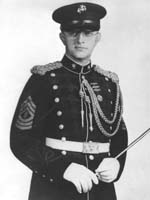
Joined Sept. 5, 1923, as a violinist
Second Leader Dec. 1, 1935-April 1, 1940
First Leader April 1, 1940- April 30, 1955
William F. Santelmann, USMC (Ret.), was 21st Leader/Director of the United States Marine Band, serving from 1940-1955.
Santelmann was born in Washington, D.C., in 1902. His musical training began at age 6 when he studied violin with his father, then-Director of the Marine Band Captain William H. Santelmann. He attended the McKinley Manual Training High School in Washington, D.C., graduating in 1921. Santelmann attended Washington College of Music followed by the New England Conservatory of Music in Boston.
In 1923, Santelmann joined the Marine Band as a violinist following a successful second audition; his father had rejected him after his first audition a few months prior. Although he had been found to be an accomplished violinist, he was not able to perform well enough on a brass instrument, at that time a requirement of all members. Following intense study on the euphonium he was found to be acceptable; he joined the Marine Band Sept. 5, 1923.
Santelmann appeared as a featured soloist with the Marine Chamber Orchestra during his first concert season and in 1925, after just two years with the organization, was named concertmaster of the orchestra. In 1935, he was selected to succeed Arthur Witcomb as Second Leader of the band.
On April 1, 1940, following the retirement of Captain Taylor Branson, Santelmann became Director of the band. For the next 15 years he served as director of the band, a period of time that included the very trying times of World War II. He led the band in a command performance for President Franklin D. Roosevelt and his guest, Winston Churchill, during one of Churchill’s wartime visits to the White House. In 1943 he supervised the formation of the U.S. Marine Corps Women’s Reserve Band located at Camp Lejeune, N.C. On April 14, 1945, Santelmann led the Marine Band in the funeral procession for President Franklin D. Roosevelt.
Santelmann, who had been commissioned a captain in 1942, proved to be a very fine musician and leader. His excellent and tireless work with the band was recognized by his promotion to major in 1947. Four years later he was promoted to lieutenant colonel. He retired from the Marine Band April 30, 1955.
For the next 20 years Santelmann sustained a demanding schedule of guest conducting appearances across the country. On March 30, 1984, immediately following a guest appearance conducting the Marine Band in a concert for the American Band Masters Association in Tempe, Ariz., Santelmann suffered a fatal heart attack which ended a life of unparalleled musical accomplishment and service.